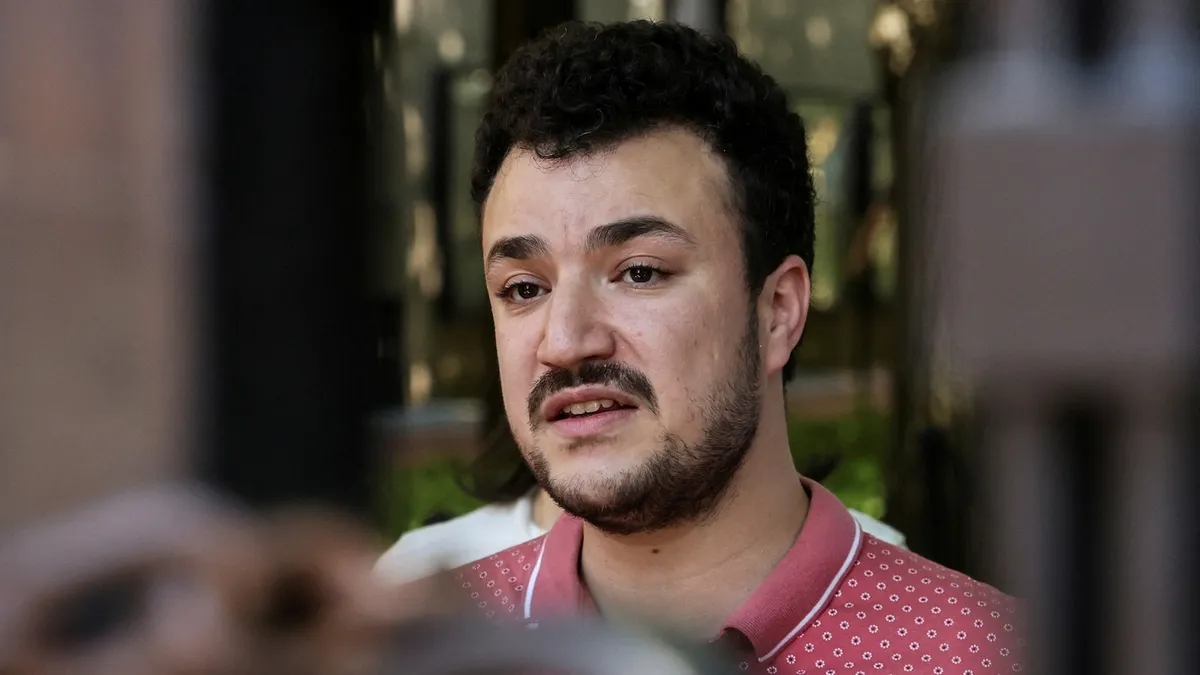
In a controversial ruling made on Friday, an immigration judge determined that Mahmoud Khalil, a prominent activist from Columbia University, is eligible for deportation. This decision was based on claims made by the Trump administration that Khalil poses a threat to U.S. foreign policy. The ruling has significant implications, potentially affecting hundreds of other international students who have also been targeted by the administration.
The judge, based in Louisiana, has instructed Khalil's legal team to submit applications for relief by April 23. Should they fail to meet this deadline, the judge indicated she would initiate an order to deport Khalil either to Syria or Algeria. The ruling left many supporters in shock, with some visibly emotional in the courtroom as the judge accepted the government's assertion that no additional evidence was required to support their claims against Khalil.
After the hearing was adjourned, Khalil addressed the court directly, highlighting a previous comment made by the judge regarding due process and fundamental fairness. "I would like to quote what you said last time that there's nothing that's more important to this court than due process rights and fundamental fairness," Khalil stated. "Clearly what we witnessed today, neither of these principles were present today or in this whole process." He expressed concern for not only his situation but for the many others in similar circumstances who have been without hearings for months.
Judge Jamee Comans' decision aligns with Secretary of State Marco Rubio's assertion that Khalil's actions in the U.S. have adverse consequences for foreign policy. Following the ruling, Khalil's wife, Noor Abdalla, released a statement describing the decision as a "devastating blow" to their family. Abdalla emphasized that "No person should be deemed removable from their home for speaking out against the killing of Palestinian families, doctors, and journalists." She further condemned the government’s allegations as baseless and indicative of a larger issue within the immigration system.
The deportation hearing occurred concurrently with an active federal court case in New Jersey, where a judge ruled that Khalil could not be deported while that case was pending. Khalil's attorney, Marc van der Hout, expressed concern over the ruling, stating, "Today, we saw our worst fears play out: Mahmoud was subject to a charade of due process." He highlighted the potential for this case to set a dangerous precedent where individuals could be targeted for exercising their right to free speech.
The immigration court has strict limitations on discovery and witness subpoenas, which was noted by the judge during the proceedings. Earlier in the week, she had ordered the government to provide evidence supporting allegations that Khalil misrepresented information on his green card application. Despite Khalil's legal team presenting counter-evidence, including statements where he denounced antisemitism, the judge did not address this information and instead accepted a brief memo from Rubio as sufficient.
Amol Sinha, executive director of the ACLU-NJ and part of Khalil's legal team, criticized the ruling, stating, "This finding of removability is a dangerous departure from the fundamental freedoms at the bedrock of our nation that protect free speech under the First Amendment." Sinha vowed to continue advocating for Khalil's release and expressed confidence in their eventual success.
While studying at Columbia University, Khalil was an active participant in leadership protests against the war in Gaza, advocating for the university to sever ties with Israel and divest from Israeli companies. He completed his graduate studies in December and is expected to graduate in the spring. Khalil's personal circumstances are also pressing, as his wife is nearing the birth of their first child.
The government recently submitted a memo from Rubio asserting that Khalil's presence in the U.S. could compromise U.S. foreign policy interests. Khalil's attorneys countered that the government failed to provide evidence supporting this claim and emphasized that such determinations should be made by a judge based on substantial evidence.
As this case progresses, advocates are concerned about the implications it holds for others who engage in political activism and free speech, fearing that if Khalil can be targeted for his beliefs, anyone could face similar repercussions for voicing dissent against the current administration.